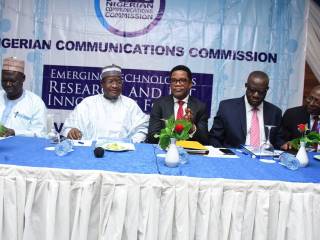...We're committed to digital access - Danbatta
Representatives of the academic community have scored the Nigerian Communications Commission (NCC) high for setting the pace in the promotion of Information and Communication Technology (ICT) innovation through investing in research across tertiary institution in Nigeria.
University dons, who were impressed by NCC's performance in driving ICT research and innovation, gave the appraisal at the Emerging Technologies and Innovation Forum organised by the NCC in Kano on Wednesday (14th August) with the theme: "Developing Nigeria's Tech Ecosystem: Imperative for Improving Local Contents."
They also urged government ministries, department and agencies (MDAs) to emulate the leadership style and finesse of the Executive Vice Chairman of NCC, Prof. Umar Danbatta imbued with the penchant to promote universities-driven ICT-researches and innovations since assuming office as the helmsman of the Commission in 2015.
This is just as Danbatta at the forum said that the Commission was committed to ensuring the taking of the huge 60 terabits of undersea bandwidth capacity lying on the Lagos shores to different parts of the country to further deepen digital access to fuel ICT innovation and local content development.
Danbatta added that the NCC will continue to encourage tech entrepreneurship and innovation in the ICT sector, stressing that the Commission has recently embarked on visitation to various tech startups across the six geo-political zones in Nigeria to assess ICT development needs and challenges.
"Whereas, mobile network operators have developed infrastructure to support voice services and access to data, it has become expedient for them to unlock new services and sources of value generation and revenue streams in their operation.
"It has, therefore, become necessary to innovate on how to access segments of the consumer wallets not presently allocated to communications by providing solutions to consumer needs in other vertical areas of education, health, government services etc. made available through telecom network infrastructure. We have to be innovative to make other aspect of our lives work. It is this reality that the NCC is committed to promoting," he said.
Meanwhile, the university dons, who spoke during panel sessions at the forum, noted that the Danbatta-led NCC has been demonstrating uncommon commitment towards deepening digital access and promoting digital innovation at all levels of education in the country.
One of them, Dr. Manir Kamba, Senior Lecturer, Bayero University, Kano, recognised the NCC's giant strides in driving frontiers for digital innovation. He averred that the need to train and retrain people, especially the academia in Nigeria and build their capacities for churning out digital innovations has become necessary to boosting local content development.
Kamba further called for a review of the academic curricula across different educational levels, stating "we need to inject practicals on disruptive technologies to be 30 per cent of our curriculum content; but if this is not done, Nigeria will not be able produce a workforce that will be able to use digital skills to move the nation forward.”
In the same vein, Dr Jamil Galadanci, Lecturer, Bayero University Kano, who commended the Commission for being a pace setter in ICT development, suggested that curriculum in schools for teaching ICT-related courses should be 50 percent theory and 50 percent practicals.
"Until these devices become part of children’s lives, they cannot start thinking of innovations using those tools later in life. I will suggest that curirculum reviews start from the primary education level, continue in the secondary and tertiary level as digital technology changes are exponential,” Galadanci said.
While noting that the “NCC has already set the pace in ICT development by supporting research and improving telecom infrastructure," Galadanchi urged universities to partner with technology hubs and state governments in research and development to create digital innovative solutions.

